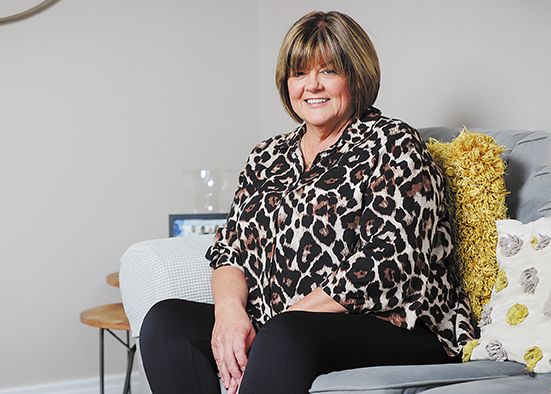The last thing I was expecting to hear was that I had cancer
The last thing I was expecting to hear was that I had cancer
3 April 2024

A KILLOUGH mum-of-two, who is living with lung cancer, is backing a major campaign by Cancer Research UK encouraging people to contact their GP with any new or unusual symptoms. ??
Sharon Dinu (58) says she is grateful to a close friend who persuaded her to ring her GP when she coughed a spot of blood and then developed severe pain in her side.
The care worker’s world was rocked in December 2020 when she was told she had lung cancer which had spread to her ribs.
Sharon said: “If my friend hadn’t urged me to get checked out I might not have gone to my GP when I did.
“I know so many people who ignore symptoms, not believing it could be anything serious. The last thing I was expecting to hear was that I had cancer. I now know that if something’s not normal for you, it could be a sign of cancer. I wish I’d been more aware of that.”
That’s why Sharon is passionate about backing ‘Spot Cancer Early’ – Cancer Research UK’s early diagnosis campaign aimed at Northern Ireland’s over 50s.??
Running this March and April, the campaign uses a powerful TV advert that features someone debating with themselves about whether to contact their doctor because they have a persistent cough and breathlessness.
The ad finishes with the charity’s vital message:?“Changes that are unusual for you, like unexplained weight loss, a persistent cough or breathlessness, could be signs of lung cancer. Finding cancer early could save your life. Talk to your GP, not yourself.”??
Despite GP surgeries being very busy, Cancer Research UK is urging people not to delay contacting their doctor.
Sharon, who is married to Licutz (56), a day care manager, and mum to Toni (26) and Sam (22), says grateful that after immunotherapy and chemotherapy treatment, the lung cancer she was diagnosed with is now under control.
Sharon recalled: “I was talking on the phone one day with my best friend Michelle when I coughed into a tissue and there was a bright red spot of blood, it was like a pin prick, it was so tiny.
“I told my friend and she said I needed to go and see about it. I told her I might ring my GP tomorrow, but I didn’t and then I suddenly developed a pain in my left side.
“The pain got worse very quickly and I thought about what my friend had said and I rang my GP who referred me for an X-ray.
“I was told to go to the Ulster Hospital in Dundonald. I knew the minute the doctor walked in that it was bad news. He said he didn’t know how he was going to tell me this but there was a shadow on my right lung and he suspected it could be cancer and that I needed a CT scan.
“Nothing prepared me for it; I hadn’t even suspected by the tiniest wee bit that I could have cancer. I was in bits. My world near enough fell around me.”
On December 9, 2020, it was confirmed that Sharon had lung cancer. The scans showed that she had three tumours. One was so big that it had
broken a rib which is why she had been in so much pain.
Thankfully, after two years of immunotherapy and chemotherapy the tumours in Sharon’s ribs disappeared. The cancer in her lung has shrunk and is now stable.
Just five days after her treatment finished in March 2023, Sharon joined her local open water swimming group and has been in the sea beside her home every day since. She also recently took up cycling and is slowly enjoying a return to normal life.
Sharon is monitored closely by her health team and her latest scan revealed the cancer in her right lung remains stable.
She said: “The cold water swimming is great for the mind and soul, when you put your head under the water you forget about cancer, you forget about everything.
“It is exactly a year this month since my treatment stopped and cancer hasn’t raised its ugly head since.
“When I was diagnosed there were six options for treatment and now there are 20 which just shows how important research is.
“I was lucky that my friend urged me to go to my GP and I got there on time.
She added: “I think the Spot Cancer Early campaign is so important and hopefully it will encourage people to not hesitate but go to their doctor if there are any changes to their health, it could save your life.”
Cancer Research UK chief executive Michelle Mitchell said lung cancer affects too many families in Northern Ireland.?
“We’d like to see many more people diagnosed at an?early stage, when more treatment options are available,” she said.??
“Unusual changes in your health such as breathlessness or a cough that won’t go away, could be signs of lung cancer.?If you’ve noticed any of these changes, your GP wants to hear from you.??In most cases, it will be a sign of something less serious, but if it is
cancer, spotting it early can make all the difference.”?
In Northern Ireland each year, around 10,100 people are given the news that they have cancer, with most cases being diagnosed in people aged 50 and over. Around 1,400 of them are diagnosed with lung cancer.
The Spot Cancer Early campaign is funded by the Department of Health Cancer Charities Support Fund and supports the cancer strategy in Northern Ireland.
It is being run by Cancer Research UK in partnership with the Public Health Agency and the NI Cancer Programme (Legacy NICaN).
Stormont Health Minister Robin Swann MLA said: “We know the early diagnosis of cancer can be life-saving which is why the Spot Cancer Early campaign is so important.
“It’s vital people in Northern Ireland are alert to symptoms like a persistent cough and breathlessness that won’t go away, and they visit their GP for further investigation.”
The campaign is also supported by the Royal College of General Practitioners.
Its chair, Ursula Mason, said: “If you have noticed any unusual changes in your health, we are here to help you.
“Please do get in touch with your GP surgery who will do their very best to help find out what is causing your symptoms. In most cases it won’t be lung cancer, but if it is, spotting it early can make all the difference.
“Every person deserves the best chance of having an early-stage diagnosis when treatment is more likely to be successful.”
For more information, visit cruk.org/northernireland.

